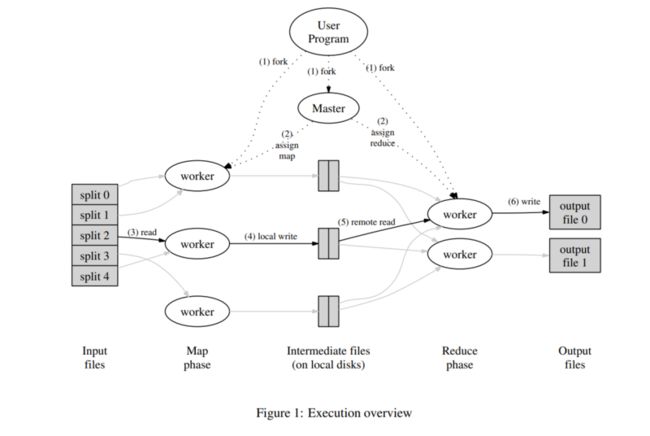- BUU5 [网鼎杯 2020 青龙组]notes1
ianozo
windows服务器linux
题目源代码:varexpress=require('express');varpath=require('path');constundefsafe=require('undefsafe');const{exec}=require('child_process');varapp=express();classNotes{constructor(){this.owner="whoknows";thi
- MIT6.824 课程-MapReduce
余为民同志
6.824mapreduce分布式6.824
MapReduce:在大型集群上简化数据处理概要MapReduce是一种编程模型,它是一种用于处理和生成大型数据集的实现。用户通过指定一个用来处理键值对(Key/Value)的map函数来生成一个中间键值对集合。然后,再指定一个reduce函数,它用来合并所有的具有相同中间key的中间value。现实生活中有许多任务可以通过该模型进行表达,具体案例会在论文中展现出来。以这种函数式风格编写的程序能够
- 2020-04-21(105)阅读摘抄与思考《老喻的人生算法》第23篇 别动不动就赌上你的人生
匠才文化
※书名BOOKTITLE老喻的【人生算法】基本信息BASICS作者:老喻出版社:得到APP阅读进度:83%阅读心得LEARNINGS1、不要透支你的本钱,比如身体,不然,你财富再多也会变得一无所有。2、冒险是一种值得提倡的精神,但不能把所有全部押上。3、幸运再多次,但只要有一次失败就玩完的事,绝对不要干。重点摘录NOTES1、我认为防爆思维应该排在所有金钱规则里的第一位。2、巴菲特对这件事感到不可
- 【COMP337 LEC1】
WINNER505
机器学习人工智能
DataPreprocessingPhase数据预处理1.Featureextraction特征提取1.Anobjectisdescribedbyacollectionofattributes一个对象可以由一组特征来描述2.Afeatureisapropertyoracharacteristicofanobjects物体的属性2.Datacleaning数据清洗Extracteddatamayha
- 【COMP337 LEC2】
WINNER505
机器学习人工智能
AssociationPatternMining关联模式挖掘Specialcase:FrequentPatternMining(binarydatasets)频繁模式挖掘Givendatamatrix,identifyallsubsetsofcolumns(features)suchthatatleastafractionofrows(objects)inthematrixhaveallthefe
- 【notes1】samba服务器,pip/office/pi/版本,文件
码农编程录
noteslinux
文章目录1.Samba服务器:利用文件传输协议:ftp,http,SMB(Samba)1.1隐藏共享和拒绝访问:无法在网上邻居看到我们所共享的文件夹,但是通过unc路径做具体指定,我们可以访问到该文件夹下1.2别名:别名配置文件要自己建立1.3免登陆名:启用share级别(安全性最低,不需要通过用户名认证)1.4linux访问windows共享目录:mount2.pip/ffmpeg/office
- CMU15-440-P0:Implementing a key-value messaging system
sdj222555
分布式
准备继续更新blog。最近工作上一直在写业务,看些课程换换脑子。15-440是CMU的一个分布式课程http://www.cs.cmu.edu/~15-440/syllabus.html,其实之前在学校的时候就上过分布式的课程,当时用的MIT6.824的课件,可惜当时很多paper没有仔细去看,只是把作业做了下,除了lab1都没有写blog记录,导致后来有时间写blog的时候很多细节都不记得了。这
- redis持久化
背帆
redisredis数据库
持久化:可以理解为mit6.824教的主从备份机制,状态转移对应RDB,复制状态机对应AOF,RDB是全部数据的二进制快照文件,AOF是文本追加的日志。RDB拷贝全部数据慢,是分钟级别的恢复机制但恢复更快,AOF通常设置1秒保存一次。官方推荐默认使用RDB,但AOF与RDB同时开启仅使用AOFRDB触发:1、主动执行save(阻塞)或bgsave(非阻塞)。2、达到阙值。3、关闭redis。RDB
- 6.824-Lab 1: MapReduce
向来痴_
mapreduce大数据
lab1链接:6.824Lab1:MapReduce(mit.edu)介绍在这个实验中,你将构建一个MapReduce系统。你将实现一个工作进程(workerprocess),调用应用程序的Map和Reduce函数,并处理文件的读写,以及一个主进程(masterprocess),分配任务给工作进程并处理失败的工作进程。你将构建的系统与MapReduce论文中描述的相似。合作政策你必须自己编写你提交
- 数据库系统知识点总结与英文课件翻译
StuGeek
数据库系统数据库
数据库系统lec1数据库系统概述1、什么是数据库P3Data数据:factsandstatisticscollectedtogetherforreferenceoranalysis.收集事实和统计数据以供参考或分析。Database数据库:Data+BaseAverylarge,structuredcollectionofdata.一个非常大的、结构化的数据集合。Modelssomereal-wo
- MIT 6.5830 概述
一颗小小的石头.
MIT6.5830数据库开发mit课程
简介同MIT6.824系列类似,6.4830是关于DatabaseSystem的一门课程,官方主页链接。从课程信息可知,理论课分为21个课时,3个问题集,4个实验,1个项目。课程的ppt可以下载,对应的课堂回放可以直接在YouTube上观看。课程要求对数据库有基础理解,如下:SQL。会基本的crud操作,包括join、groupby等实操经验。执行/存储引擎聚簇索引查询优化分析内容21节课程比较啰
- MapReduce 论文阅读笔记 MapReduce 简介
RzBu11d023r
分布式系统摘要性笔记mapreducebigdata大数据
论文:MapReduce:SimplifiedDataProcessingonLargeClustersJeffreyDeanandSanjayGhemawatGooglehttps://pdos.csail.mit.edu/6.824/papers/mapreduce.pdfMapReduce是一种分布式系统中处理大数据方法。他提出是在2004,jeffdean和SanjayGhemawat的作
- 分布式一致性算法---Raft初探
小帅吖
分布式系统分布式共识算法raft分布式系统
读Raft论文也有一段时间了,但是自己总是以目前并没有完全掌握为由拖着这篇博客。今天先以目前的理解程度(做了6.824的lab2A和lab2B)对这篇论文做一个初步总结,之后有了更深入的理解之后再进行迭代,关于本文有任何疑问欢迎评论交流。另外需要说明的是本篇博客并没有对Raft算法的背景和基础知识进行全面介绍,所以需要有一定的基础之后进行阅读。基本概念三种状态及相互转换关系Raft算法中每个服务器
- MIT 6.824 分布式系统 lab1 MapReduce 遇到死锁问题
花里胡哨的菜只因
mapreduce大数据
记录学习6.824的lab1遇到的坑(死锁了)代码逻辑借鉴:https://blog.csdn.net/weixin_45938441/article/details/124018485问题描述目前处于编写worker与coordinate进行RPC通信的环节,worker中的Map和Reduce方法还都没有开动只有一个打印逻辑,只是想先测一下,worker和coordinate之间能否正常通信。
- 【分布式-6.824】MIT分布式系统概述
我要精通C++
分布式分布式
1.引入论文地址:http://nil.csail.mit.edu/6.824/2020/schedule.html参考lab:https://github.com/aQuaYi/MIT-6.824-Distributed-Systems推荐书目:DDIA数据密集型应用系统设计https://book.douban.com/subject/30329536/--推荐书《DesigningData-
- 6.824 Lab3 KVRAFT总结
Countingstarss
1引言实验结果对于3A部分,可以稳定通过测试,结果如下:Test:oneclient(3A)......Passed--15.352021212Test:manyclients(3A)......Passed--16.453230466Test:unreliablenet,manyclients(3A)......Passed--17.152616311Test:concurrentappendt
- CMU 15445 Project 2A 实现并发B+树的数据库索引(查询和插入)
西部小笼包
项目文档在这里,这个PROJECT我大概看了下描述。还是比较有挑战的,所以我会写的详细一点。但和MIT6.824那样一步步手把手指导,还是会不同。这边我重点挑我认为不是无脑就可以实现的部分写。https://15445.courses.cs.cmu.edu/fall2018/project2/按照CHECKPOINTA的描述,大概我们会改动image.png在此之前,我建议你做一下HOMEWORK
- MIT 6.824 练习1
Daniel_187
Gogo分布式网络爬虫爬虫
Hi,there!这是一份根据MIT6.824(2021)课程的第2课的课堂示例代码改编的2个go语言编程练习。像其他的编程作业一样,我去除了核心部分,保留了代码框架,并编写了每一步的提示练习代码在本文的最后面爬虫在第一部分,你需要实现3个版本的网络爬虫。1单线程爬虫首先,请为fakeFetcher类型实现Fetcher接口中的Fetch()方法。然后实现串行爬虫Serial()函数(递归),并在
- 【MIT 6.824 分布式系统】Lecture2中的 crawler.go 代码及解析
背书包的小新
爬虫golang开发语言
packagemainimport("fmt""sync")////SeveralsolutionstothecrawlerexercisefromtheGotutorial//https://tour.golang.org/concurrency/10//////Serialcrawler////看Mit这节课的时候,感觉mit的学生真的很不一样,一直在提问题,而且直接打断老师并说出自己的想法。
- Redis集群:分布式的less is more
SakamataZ
redis分布式数据库
Redis完全就是《数据密集型应用系统设计》的简单实现,主打一个**大道至简**。推荐配合这本书(或者15-445+6.824)一起看[1]。本文就从分布式视角来介绍下Redis集群模式,顺便看看一些经典的分布式问题在redis下如何解决。**这篇文章主要提供一个highlevel的视角,也就是聚焦于所有分布式系统都会有的一些问题,而不仅限于Redis,阅读时可以多带入自己熟悉的系统的视角。**比
- 2020-01-13(92)阅读摘抄与思考 老喻的《人生算法》第10篇 不要片面的人生
匠才文化
书名BOOKTITLE老喻的【人生算法】基本信息BASICS作者:老喻出版社:得到APP阅读进度:五分之二阅读心得LEARNINGS1、经过深度思考后的选择,比一般的努力更有意义。2、考虑事情的时候,一定是立体和多层次的思考。3、坚持把一本书读懂读透是一件关乎人生成就的事业。重点摘录NOTES1、我们打造好了一部赛车,现在要开始去选赛道了。2、老板旋钮、教练旋钮、车手旋钮,是你需要切换的三个角色和
- 6.824 Lab2 RAFT总结
Countingstarss
1引言大约用了20多天的时间完成了6.824的lab2,期间穿插了毕业预答辩,改论文,准备外审等等事情,最终磕磕绊绊的完成了Lab2,感觉算是自己写的程序中比较具有挑战性的了,因为在实验过程中需要认真的考虑并发、加锁、死锁等问题,并且实际RAFT论文中省去了很多细节,而且为了尽量通过测试与优化性能,本人也对与RAFT论文中很多细节进行更改,因此该Lab的完成具有一定挑战。实验结果开门见山,先放结果
- MIT 6.824 -- MapReduce Lab
Binary Oracle
#MIT6.824mapreduce大数据
MIT6.824--MapReduceLab环境准备实验背景实验要求测试说明流程说明实验实现GoLand配置代码实现对象介绍协调器启动工作线程启动Map阶段分配任务执行任务Reduce阶段分配任务执行任务终止阶段崩溃恢复注意事项并发安全文件转换golang知识点测试环境准备从官方git仓库拉取分支gitclonegit://g.csail.mit.edu/6.824-golabs-20206.82
- MIT6.824-lab2A-2022篇(万字推导思路及代码构建)
幸平xp
分布式后端分布式golang
目录前言一、学习背景二、实验引入三、结构体实现3.1State的定义3.2AppendEntriesRPC的定义3.3RequestVoteRPC的定义四、领导选举4.1初始化raft节点4.2Ticker(建立主体的心跳)4.3投票RPC实现五、日志增量/心跳建立5.1心跳/日志增量RPC实现5.2Test情况六、DeBug杂谈总结前言趁着五一没啥事情,花两天把lab2A写一下…还是老样子,希望
- MIT6.824-lab2B-2022篇(万字推导思路及代码构建)
幸平xp
分布式开发语言go分布式
提示:文章写完后,目录可以自动生成,如何生成可参考右边的帮助文档文章目录前言一、整体流程思路二、初始化,发送ticker2.1、初始化2.2、发送ticker三、进行日志增量的RPC3.1、进行reply构造3.2、处理reply四、Debug五、总结前言忙里偷闲总算是把lab2b肝完了…不得不说五月真是最近最忙的一个月。对于lab2b,难度其实确实比lab2a大,甚至是比整个Lab1大的。2b其
- Mit6.824-lab2d-2022
eternalex
Mit6.824分布式
Mit6.824-lab2d-2022写在前面如果你听从了我在2a里的建议,计算下标时已经考虑到了snapshot并且有好好做过2a和2b实验的设计与debug,那2d实验和2c差不多一样简单,只完成snapshot和installSnapshot这两个功能,并在适时的位置调用即可。如果你是和我一样什么也没有准备,就一个实验一个实验接着往下做,那想要2d做到完善,就需要大量的填补漏洞与漫长的deb
- Mit6.824-lab3a-2022
eternalex
Mit6.824分布式go算法
Mit6.824-lab3a-2022写在前面个人感觉lab3相比于lab2要简单不少,唯一的难点应该就是没有lab2那样明确的paper指导。对我来说花费时间最多的反而是对lab2的修补,用了一个大佬的lab2代码,两天就把lab3的代码全部通过测试,回过头来debug自己lab2的代码反反复复花了一个多星期。而且和lab2直接对raft进行debug不同,lab3要结合自己的逻辑然后和lab2
- Mit6.824-lab3b-2022
eternalex
Mit6.824golang分布式算法
Mit6.824-lab3b-2022写在前面个人感觉3b需要做的工作比3a还要简单,只是添加了个server的snapshot,但是由于加入了snapshot所以3a的测试对raft的代码要求又高了一个档次,我基本上所有的精力也都花到对raft部分的debug上了,由于进行apply的chan不能上锁,这里会出现各种乱序的bug,只能说这个地方的设计确实是有点难受了。而且每次十几万行的log信息
- Mit6.824-lab2a-2022
eternalex
Mit6.824服务器javascript前端
Mit6.824-lab2a-2022实验介绍实验建议1.熟悉整个实验2.提前做好后两个实验的准备3.写好功能函数4.做足够的测试2a实验内容具体实现测试错误信息实验介绍lab2总体是要复现一个简易的Raft系统,这个实验被分为了四个部分2a,Leader的选举与保持;2b,log的添加;2c,数据持久化与服务器恢复2d,snapshot实现实验的重点是2a和2b,如果这两个部分没有打好基础,后面
- MIT 6.824-lab2 Raft
东东儿
6.824goraft算法分布式mit分布式一致性协议
这个lab2属实麻烦,花了两天时间写代码,最后花了四天时间来debug才通过,debug的手段也很有限,基本只能通过看日志来发现代码中的逻辑问题,最终回顾写出来的代码还乱得不行,先做个简单的记录,以后如果还有时间来重构一下代码。1.Raftraft算法是一种分布式共识算法,相对于paxos算法而言更加简单容易理解(看起来简单,实现起来也挺不容易的)。raft的论文很多,也有很多中文版的,看一看很容
- LeetCode[Math] - #66 Plus One
Cwind
javaLeetCode题解AlgorithmMath
原题链接:#66 Plus One
要求:
给定一个用数字数组表示的非负整数,如num1 = {1, 2, 3, 9}, num2 = {9, 9}等,给这个数加上1。
注意:
1. 数字的较高位存在数组的头上,即num1表示数字1239
2. 每一位(数组中的每个元素)的取值范围为0~9
难度:简单
分析:
题目比较简单,只须从数组
- JQuery中$.ajax()方法参数详解
AILIKES
JavaScriptjsonpjqueryAjaxjson
url: 要求为String类型的参数,(默认为当前页地址)发送请求的地址。
type: 要求为String类型的参数,请求方式(post或get)默认为get。注意其他http请求方法,例如put和 delete也可以使用,但仅部分浏览器支持。
timeout: 要求为Number类型的参数,设置请求超时时间(毫秒)。此设置将覆盖$.ajaxSetup()方法的全局
- JConsole & JVisualVM远程监视Webphere服务器JVM
Kai_Ge
JVisualVMJConsoleWebphere
JConsole是JDK里自带的一个工具,可以监测Java程序运行时所有对象的申请、释放等动作,将内存管理的所有信息进行统计、分析、可视化。我们可以根据这些信息判断程序是否有内存泄漏问题。
使用JConsole工具来分析WAS的JVM问题,需要进行相关的配置。
首先我们看WAS服务器端的配置.
1、登录was控制台https://10.4.119.18
- 自定义annotation
120153216
annotation
Java annotation 自定义注释@interface的用法 一、什么是注释
说起注释,得先提一提什么是元数据(metadata)。所谓元数据就是数据的数据。也就是说,元数据是描述数据的。就象数据表中的字段一样,每个字段描述了这个字段下的数据的含义。而J2SE5.0中提供的注释就是java源代码的元数据,也就是说注释是描述java源
- CentOS 5/6.X 使用 EPEL YUM源
2002wmj
centos
CentOS 6.X 安装使用EPEL YUM源1. 查看操作系统版本[root@node1 ~]# uname -a Linux node1.test.com 2.6.32-358.el6.x86_64 #1 SMP Fri Feb 22 00:31:26 UTC 2013 x86_64 x86_64 x86_64 GNU/Linux [root@node1 ~]#
- 在SQLSERVER中查找缺失和无用的索引SQL
357029540
SQL Server
--缺失的索引
SELECT avg_total_user_cost * avg_user_impact * ( user_scans + user_seeks ) AS PossibleImprovement ,
last_user_seek ,
- Spring3 MVC 笔记(二) —json+rest优化
7454103
Spring3 MVC
接上次的 spring mvc 注解的一些详细信息!
其实也是一些个人的学习笔记 呵呵!
- 替换“\”的时候报错Unexpected internal error near index 1 \ ^
adminjun
java“\替换”
发现还是有些东西没有刻子脑子里,,过段时间就没什么概念了,所以贴出来...以免再忘...
在拆分字符串时遇到通过 \ 来拆分,可是用所以想通过转义 \\ 来拆分的时候会报异常
public class Main {
/*
- POJ 1035 Spell checker(哈希表)
aijuans
暴力求解--哈希表
/*
题意:输入字典,然后输入单词,判断字典中是否出现过该单词,或者是否进行删除、添加、替换操作,如果是,则输出对应的字典中的单词
要求按照输入时候的排名输出
题解:建立两个哈希表。一个存储字典和输入字典中单词的排名,一个进行最后输出的判重
*/
#include <iostream>
//#define
using namespace std;
const int HASH =
- 通过原型实现javascript Array的去重、最大值和最小值
ayaoxinchao
JavaScriptarrayprototype
用原型函数(prototype)可以定义一些很方便的自定义函数,实现各种自定义功能。本次主要是实现了Array的去重、获取最大值和最小值。
实现代码如下:
<script type="text/javascript">
Array.prototype.unique = function() {
var a = {};
var le
- UIWebView实现https双向认证请求
bewithme
UIWebViewhttpsObjective-C
什么是HTTPS双向认证我已在先前的博文 ASIHTTPRequest实现https双向认证请求
中有讲述,不理解的读者可以先复习一下。本文是用UIWebView来实现对需要客户端证书验证的服务请求,网上有些文章中有涉及到此内容,但都只言片语,没有讲完全,更没有完整的代码,让人困扰不已。但是此知
- NoSQL数据库之Redis数据库管理(Redis高级应用之事务处理、持久化操作、pub_sub、虚拟内存)
bijian1013
redis数据库NoSQL
3.事务处理
Redis对事务的支持目前不比较简单。Redis只能保证一个client发起的事务中的命令可以连续的执行,而中间不会插入其他client的命令。当一个client在一个连接中发出multi命令时,这个连接会进入一个事务上下文,该连接后续的命令不会立即执行,而是先放到一个队列中,当执行exec命令时,redis会顺序的执行队列中
- 各数据库分页sql备忘
bingyingao
oraclesql分页
ORACLE
下面这个效率很低
SELECT * FROM ( SELECT A.*, ROWNUM RN FROM (SELECT * FROM IPAY_RCD_FS_RETURN order by id desc) A ) WHERE RN <20;
下面这个效率很高
SELECT A.*, ROWNUM RN FROM (SELECT * FROM IPAY_RCD_
- 【Scala七】Scala核心一:函数
bit1129
scala
1. 如果函数体只有一行代码,则可以不用写{},比如
def print(x: Int) = println(x)
一行上的多条语句用分号隔开,则只有第一句属于方法体,例如
def printWithValue(x: Int) : String= println(x); "ABC"
上面的代码报错,因为,printWithValue的方法
- 了解GHC的factorial编译过程
bookjovi
haskell
GHC相对其他主流语言的编译器或解释器还是比较复杂的,一部分原因是haskell本身的设计就不易于实现compiler,如lazy特性,static typed,类型推导等。
关于GHC的内部实现有篇文章说的挺好,这里,文中在RTS一节中详细说了haskell的concurrent实现,里面提到了green thread,如果熟悉Go语言的话就会发现,ghc的concurrent实现和Go有点类
- Java-Collections Framework学习与总结-LinkedHashMap
BrokenDreams
LinkedHashMap
前面总结了java.util.HashMap,了解了其内部由散列表实现,每个桶内是一个单向链表。那有没有双向链表的实现呢?双向链表的实现会具备什么特性呢?来看一下HashMap的一个子类——java.util.LinkedHashMap。
- 读《研磨设计模式》-代码笔记-抽象工厂模式-Abstract Factory
bylijinnan
abstract
声明: 本文只为方便我个人查阅和理解,详细的分析以及源代码请移步 原作者的博客http://chjavach.iteye.com/
package design.pattern;
/*
* Abstract Factory Pattern
* 抽象工厂模式的目的是:
* 通过在抽象工厂里面定义一组产品接口,方便地切换“产品簇”
* 这些接口是相关或者相依赖的
- 压暗面部高光
cherishLC
PS
方法一、压暗高光&重新着色
当皮肤很油又使用闪光灯时,很容易在面部形成高光区域。
下面讲一下我今天处理高光区域的心得:
皮肤可以分为纹理和色彩两个属性。其中纹理主要由亮度通道(Lab模式的L通道)决定,色彩则由a、b通道确定。
处理思路为在保持高光区域纹理的情况下,对高光区域着色。具体步骤为:降低高光区域的整体的亮度,再进行着色。
如果想简化步骤,可以只进行着色(参看下面的步骤1
- Java VisualVM监控远程JVM
crabdave
visualvm
Java VisualVM监控远程JVM
JDK1.6开始自带的VisualVM就是不错的监控工具.
这个工具就在JAVA_HOME\bin\目录下的jvisualvm.exe, 双击这个文件就能看到界面
通过JMX连接远程机器, 需要经过下面的配置:
1. 修改远程机器JDK配置文件 (我这里远程机器是linux).
- Saiku去掉登录模块
daizj
saiku登录olapBI
1、修改applicationContext-saiku-webapp.xml
<security:intercept-url pattern="/rest/**" access="IS_AUTHENTICATED_ANONYMOUSLY" />
<security:intercept-url pattern=&qu
- 浅析 Flex中的Focus
dsjt
htmlFlexFlash
关键字:focus、 setFocus、 IFocusManager、KeyboardEvent
焦点、设置焦点、获得焦点、键盘事件
一、无焦点的困扰——组件监听不到键盘事件
原因:只有获得焦点的组件(确切说是InteractiveObject)才能监听到键盘事件的目标阶段;键盘事件(flash.events.KeyboardEvent)参与冒泡阶段,所以焦点组件的父项(以及它爸
- Yii全局函数使用
dcj3sjt126com
yii
由于YII致力于完美的整合第三方库,它并没有定义任何全局函数。yii中的每一个应用都需要全类别和对象范围。例如,Yii::app()->user;Yii::app()->params['name'];等等。我们可以自行设定全局函数,使得代码看起来更加简洁易用。(原文地址)
我们可以保存在globals.php在protected目录下。然后,在入口脚本index.php的,我们包括在
- 设计模式之单例模式二(解决无序写入的问题)
come_for_dream
单例模式volatile乱序执行双重检验锁
在上篇文章中我们使用了双重检验锁的方式避免懒汉式单例模式下由于多线程造成的实例被多次创建的问题,但是因为由于JVM为了使得处理器内部的运算单元能充分利用,处理器可能会对输入代码进行乱序执行(Out Of Order Execute)优化,处理器会在计算之后将乱序执行的结果进行重组,保证该
- 程序员从初级到高级的蜕变
gcq511120594
框架工作PHPandroidhtml5
软件开发是一个奇怪的行业,市场远远供不应求。这是一个已经存在多年的问题,而且随着时间的流逝,愈演愈烈。
我们严重缺乏能够满足需求的人才。这个行业相当年轻。大多数软件项目是失败的。几乎所有的项目都会超出预算。我们解决问题的最佳指导方针可以归结为——“用一些通用方法去解决问题,当然这些方法常常不管用,于是,唯一能做的就是不断地尝试,逐个看看是否奏效”。
现在我们把淫浸代码时间超过3年的开发人员称为
- Reverse Linked List
hcx2013
list
Reverse a singly linked list.
/**
* Definition for singly-linked list.
* public class ListNode {
* int val;
* ListNode next;
* ListNode(int x) { val = x; }
* }
*/
p
- Spring4.1新特性——数据库集成测试
jinnianshilongnian
spring 4.1
目录
Spring4.1新特性——综述
Spring4.1新特性——Spring核心部分及其他
Spring4.1新特性——Spring缓存框架增强
Spring4.1新特性——异步调用和事件机制的异常处理
Spring4.1新特性——数据库集成测试脚本初始化
Spring4.1新特性——Spring MVC增强
Spring4.1新特性——页面自动化测试框架Spring MVC T
- C# Ajax上传图片同时生成微缩图(附Demo)
liyonghui160com
1.Ajax无刷新上传图片,详情请阅我的这篇文章。(jquery + c# ashx)
2.C#位图处理 System.Drawing。
3.最新demo支持IE7,IE8,Fir
- Java list三种遍历方法性能比较
pda158
java
从c/c++语言转向java开发,学习java语言list遍历的三种方法,顺便测试各种遍历方法的性能,测试方法为在ArrayList中插入1千万条记录,然后遍历ArrayList,发现了一个奇怪的现象,测试代码例如以下:
package com.hisense.tiger.list;
import java.util.ArrayList;
import java.util.Iterator;
- 300个涵盖IT各方面的免费资源(上)——商业与市场篇
shoothao
seo商业与市场IT资源免费资源
A.网站模板+logo+服务器主机+发票生成
HTML5 UP:响应式的HTML5和CSS3网站模板。
Bootswatch:免费的Bootstrap主题。
Templated:收集了845个免费的CSS和HTML5网站模板。
Wordpress.org|Wordpress.com:可免费创建你的新网站。
Strikingly:关注领域中免费无限的移动优
- localStorage、sessionStorage
uule
localStorage
W3School 例子
HTML5 提供了两种在客户端存储数据的新方法:
localStorage - 没有时间限制的数据存储
sessionStorage - 针对一个 session 的数据存储
之前,这些都是由 cookie 完成的。但是 cookie 不适合大量数据的存储,因为它们由每个对服务器的请求来传递,这使得 cookie 速度很慢而且效率也不
